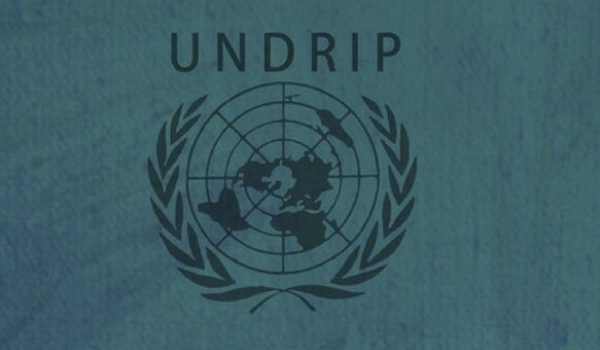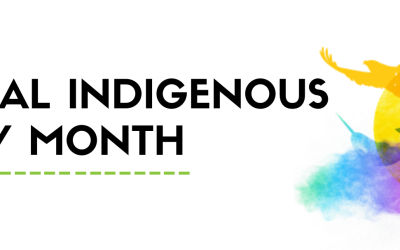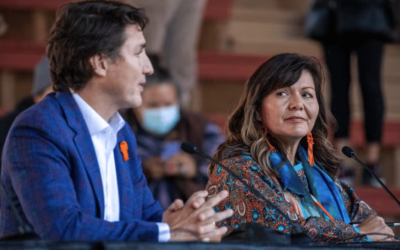“A government’s most basic function is the protection of its sovereignty.” – Simon Schama
Internal attacks by our political and judicial elites against the sovereignty of our country’s federal, provincial, and territorial governments are placing the existence of Canada in peril. Several examples illustrate this point.
First, BC First Nations are now reasonably claiming in court that the B.C. government has no right to grant mineral prospecting claims without first getting their “free, prior, and informed consent,” as required by BC’s Declaration of the Rights of Indigenous Peoples Act, (DRIPA). This legislation was passed so that First Nations could, in fact, diminish the BC government’s sovereign right to enact and administer provincial laws.
Second, in 2021, the British Columbia Supreme Court ruled that the cumulative effects of civilization since Treaty 8 was signed in 1900, has negatively affected the First Nations’ harvesting activities, and is a treaty violation, for which amends are owed.
This decision was not appealed by the BC government, and so, the government ceded a large part of its sovereignty to the First Nations. For example, in Vancouver, the Squamish First Nation is flouting municipal and provincial laws with the construction of a eleven tower residential/commercial complex. The municipal by-laws restrict the height of buildings to five stories, but the tallest building in this complex will be 58 stories. Even so, the buildings are still being constructed.
Third, several Saskatchewan’s First Nations dispute that the provincial government has exclusive jurisdiction over natural resources. The First Nations claim that they must be consulted about who can have forestry permits, land grants, and mining permits. Grand Chief Brian Hardlotte, from the Prince Albert Grand Council, describes Saskatchewan’s natural resources as “Indian natural resources.” Similarly, an Alberta First Nations band is making the same claim against the Alberta government.
The fact that there are challenges to the treaty-surrendered, sovereign rights of the Crown is, in fact, a breach of their ancestors’ own treaty promises of loyalty to the Crown and obedience to its laws. In short, this agreement, enshrined in the treaties, is not being enforced.
Fourth, two Ontario First Nations Chiefs loudly shouted from the legislative gallery that no development in the province’s mineral-rich Ring of Fire can take place without their consent. They claim to have veto power over all resource projects in their “traditional territories.” In a recent Ontario court case, a First Nation member claimed that a patch of moose pasture was “sacred land,” and called for an injunction order being issued against a mining company who wanted to explore for minerals in the pasture.
These four examples of the judicially forced surrender or diminishment of Crown sovereignty in favour of First Nations control is supported by a deliberate emasculation of both federal and provincial Crown sovereignty by the Trudeau Liberal government.
Trudeau’s Principles for Reconciliation
To achieve “reconciliation” between Aboriginal and non-Aboriginal Canadians, the Trudeau government is devolving federal and provincial sovereignty to Indigenous Nations, making those small “nations” de facto third orders of government sharing sovereignty with the federal, provincial, and territorial governments.
This policy initiative is set out on a federal government’s website called Principles respecting the Government of Canada’s relationship with Indigenous Peoples (the Principles). It is, however, likely that these principles will create nation-wide legal chaos, economic instability, and social/racial divisiveness across the country. These principles reject many of the things that made Canada great. In addition, the principles undermine our constitutional framework, historical experience, and common sense.
The Oxford Dictionary defines “reconciliation” as “being brought into friendly relations with another after an estrangement. This is what most Canadians assume that reconciliation with Aboriginal Canadians would entail. Canadians would apologize, and forgiveness would be requested and given. A little later, the separate political state Indigenous people live with (on reserves) will be dismantled, and all Canadians will finally move forward as equals. In this ideal model of reconciliation, all considerations of race will be removed from Canadian laws.
Tragically, this is not what Ottawa, the BC government, some judges, and the leadership of Aboriginal peoples have in mind. Instead, the Trudeau Principles claim that Section 35 of the Constitution “holds the promise that Indigenous nations will become partners in Confederation.”
This is what Indigenous activists want, and so far, this promise has been “unfulfilled.” But there are no such promises in Section 35, and so far, no Court has ruled that promises are implicit in that section.
As far as we can figure out, the authors of Section 35 never dreamed that anyone would make such an assertion about their intention. For example, Bob Rae, who was a MP at the time, wrote that “no one knew exactly what the implications of these changes (to the constitution) were.” Similarly, Gordon Gibson, an Aboriginal affairs expert, and a former leader of the British Columbia Liberal Party, wrote in A New Look at Canadian Indian Policy (Fraser Institute, 2009): “This was constitution-making by inattention…. The nature of the last-minute negotiations complex, occasionally bitter, and hurried, militated against any consideration of Aboriginal rights.”
Finally, Melvin Smith, a lawyer, senior constitutional bureaucrat from British Columbia, and author of Our Home or Native Land? (Crown Western, 1995) wrote about the negotiations:
Nothing has been written that suggests there was any serious example of what the words (of Section 35) meant. If anyone had suggested (which they did not) that in later years the words would be interpreted to include the recognition of a third order of government, he would have been laughed out of court.
So, Section 35 of the Canadian Constitution does not imply anything about “Indigenous nations” becoming “partners in Confederation.” Partnership implies equality. In the treaties, Aboriginal peoples are specifically subservient to the federal and provincial governments.
Aboriginal Self-Government is an Illusion
For these reasons, Aboriginal self-government is clearly an illusion. Aboriginal governments are dependent on money from the Canadian taxpayer, as well as other support from the federal, provincial, and territorial governments. No group of people can be truly self-governing under such dependent relationships.
Of course, Indigenous groups set rules and enact laws for the lands they manage, but these are, in most cases, variation on provincial, territorial, and municipal laws and regulations, such as setting speed limits in school zones. In truth, the notion of “Indigenous laws” are largely mythological.
Nevertheless, the Trudeau Principles state that Canada “will continue the process of decolonization and hasten the end of its legacy wherever it remains in our laws and policies.”
Anyone who thinks seriously about the claim, realizes that it is impossible because colonization is simply a word for human migration, adaptation, and the inevitable consequences of this process. Colonization is, in fact, something that has happened continuously since humankind migrated out of Africa thousands of years ago. Being timeless and universal, it is blameless.
The major legacy of colonization in Canada, is the safe, ordered, and prosperous country that all Canadians, including Aboriginal people, inherited. In fact, France and Great Britain, the colonial powers that settled Canada, are themselves the product of migration and conquest, but they themselves carried out their colonialization in a humane and admirable manner.
By contrast, the Aboriginal tribes in North America engaged in conflict with other tribes, in a far more bloody and violent manner. In most cases, they made no treaties with those they threatened or conquered, and they often showed little mercy towards their enemies. Murder, torture, kidnapping, enslavement, and dispossession — genocide, in fact — are the words that usually explains this interaction. There are, for example, no Hurons living near Lake Huron largely because the Iroquois wiped them out.
Dismantling Canada
To give Indigenous communities legal rights, the Trudeau Principles state that the implementation of the United Nations Declaration of the Rights of Indigenous Peoples (UNDRIP) is, in fact, needed. But a close examination of this declaration shows that the claim is not true.
UNDRIP is not part of Canadian law. The federal UNDRIP Act, recently passed by the Trudeau government, is merely an interpretation statute. Whether it applies to existing Canadian law, will be decided after litigation which has not taken place. Unfortunately, the litigation process is likely to negatively affect the Canadian economy by the uncertainty, something that is already happening because of the Supreme Court’s “consult and accommodate” ruling.
The Trudeau Principles state that there was a “denial of Indigenous rights that led to disempowerment and assimilationist policies and practices.”
This claim is too strong because there has been almost three hundred years of Aboriginal appropriation of European material goods and participation in the Euro-Canadian economic and social system. Over this period, Indigenous people have increasingly been assimilated into Euro-Canadians culture.
Historically, Aboriginals’ power was dependent on the existence of an unpopulated and undeveloped land in which hunting and gathering, and later the fur trade and the buffalo hunt, could supply a livelihood to Indigenous people. But the mass European immigration and the industrial revolution in the late 1800’s, as well as the almost complete killing of the beaver and the buffalo resulted in the tragic collapse of Aboriginal cultures, power, and influence.
There was no villain in this process; rather, it was the result of human nature and the impersonal, universal forces—survival in the best way possible.
But even so, the Trudeau Principles state that “Indigenous nations,” must have “space for the operation of Indigenous jurisdictions and laws,” largely because they have the “inherent right of self-government.”
Why state that Indigenous people have laws and an “inherent” right to self-government? Laws and rights are created by states, and states only have rights if laws can be enforced by formal courts. Without formal enforcement, claimed rights are not laws or real rights. Aboriginal tribes were pre-state and pre-literate and were incapable of creating and enforcing laws and rights through courts.
Nevertheless, the Trudeau Principles say that the Indigenous nations will have “relationships with other orders of government,” clearly implying that Indigenous nations will form a separate and distinct order of government within Canada. In this respect, the Principles constitute an attempt to de facto amend the Canadian Constitution. There is, of course, a formal process for amending the Canadian constitution, but the Trudeau Principles ignores this procedure.
As such, the Trudeau process is an attack on the provinces and territories who, according to the constitution, own and manage the land and natural resources within their boundaries. Aboriginals may be granted the right to manage natural resources on reserve lands that have been set aside for their use, but, so far, they do not have the right to manage resources outside these reserve lands. If Aboriginal people were given this right, the provinces and territories would lose their rights which have already been enshrined in law.
As such, the provinces and territories would pay substantially if the federal government enacted the Trudeau Principles because the provinces and territories would lose control over lands and natural resources that had been delegated to them. It is extremely short-sighted that the provinces and territories were not consulted as these Principles were being formulated.
The Trudeau Principles are, in fact, dismissive and disrespectful of provincial and territorial rights. Recently, this concern was highlighted by Justice Minister David Lametti’s comments that he would be “looking at” the request from Prairie First Nations to transfer authority over natural resources to the First Nations within the three prairie provinces, Alberta, Saskatchewan, and Manitoba.
In 1790 the conservative philosopher Edmund Burke, in Reflections on the Revolution in France (Penguin Books, 2004, 1790), wrote a rebuttal to the anti-conservative utopians who were bent on destroying France to forge a “brave new world”:
The house of commons cannot renounce its share of authority. The pact of society forbids such surrender. The constituent parts of a state are obliged to hold their public faith with each other and with all those who derive any serious interests under their engagements. Otherwise, competence and power would soon be confounded, and no law left but the will of a prevailing force.
In purporting to radically remake Canada, the federal and BC governments have broken faith with the Canadian people. A particular concern is that all citizens pay taxes for the services they receive and they abide by the rule of law, (which are already seriously under challenge in Canadian life).
But most First Nations members do not pay taxes, which is the lifeblood of any state. As well, the Principles, UNDRIP, and DRIPA, are creating larger Aboriginal tax-free zones across the country, and these zones create increased demands on revenues from the federal, provincial, and territorial governments. As Edmund Burke also proclaimed:
The revenue of the state is the state. In effect, all depends on it, whether for support or for reformation…. It is the spring of all power; it becomes in its administration the sphere of every active virtue…. Through the revenue alone the body politic can act in its true genius and character.
In The Social Conquest of Earth, the late Professor Edward O. Wilson (Liveright, 2012) described the state as “the final step in the cultural evolution of societies,” with bands, tribes, and chiefdoms being earlier forms. A key feature of a successful state is a system of hierarchical control. Professor Wilson explains:
As with complexity of any physical or biological system, the society, to achieve stability and survive and not quickly crumble, must add hierarchical control…hierarchies work better than unorganized assemblages [in] that they are easier for their rulers to understand and manage. Put another way, you cannot expect success if assembly-line workers vote at executive conferences or enlisted men plan military campaigns.
The Trudeau Principles, the federal UNDRIP Act, and BC’s DRIPA Act, shows that these governments do not appreciate hierarchical control as outlined by E.O. Wilson. Indigenous nationhood is said to be parallel to the federal government and superior to provincial and territorial governments.
Finally, the Principles, UNDRIP and DRIPA are at odds with the beliefs of many Canadians who think that provincial and territorial rights and responsibilities are superior to Indigenous rights and responsibilities. Most Canadians believe that authority needs to be regulated by a strong central government, which is the hierarchical control. Canadians seem to disagree with handing provincial and territorial authority to small Indigenous “nations.”
Conclusion
Canadians are beginning to sense that they are going socially, culturally, economically, and politically backwards. These new laws and policies, advanced by the Trudeau government, support group rights based on race, and at the same time, they diminish Crown sovereignty.
The people who support this trend appear to not appreciate that the principles make up the legacy of “colonialism,” and these principles are unique and fragile, and they are the result of a couple of hundreds of years of “Eurocentric” Enlightenment thinking that could dissolve unless it is consciously defended and nurtured.
Most Canadians decry “failed states,” characterized by weak government authority, yet this is the direction the federal liberals are pushing in their interpretation of Section 35 of the Constitution, and now enshrined in the Principles, UNDRIP, and DRIPA.
Even as First Nations carry on being “sovereign” and “self-governing,” they keep their hands outstretched for help from Canadian taxpayer for many projects, water, sewage, housing, and social services, for example.
Canadians can no longer allow politicians to fritter away Crown sovereignty by pretending that small Indigenous “nations” are politically and constitutionally co-equal with the federal, provincial, and territorial governments. For Canada to truly prosper, Canadians need their political elites to assume their traditional role as stewards of the laws, practices, and constitutional principles that made Canada a model of a successful classical liberal democracy.
To do this, the political elites need to step back from the ahistorical, illiberal, sovereignty-diminishing conception they now hold, and resume their traditional stewardship by restoring Crown sovereignty to all land and water in Canada as it was before the passage of Section 35 of the Constitution Act in 1982, and the harmful legislation and policies that emanated from Trudeau’s Principle, UNDRIP, and DRIPA.
Some years ago, Nelson Mandela said that the first step to reconciliation is dismantling apartheid. But the Trudeau Principles, UNDRIP, and DRIPA enshrines apartheid, a racist, legal and policy regime that will, over time, harm all Canadians, particularly Aboriginal Canadians. Only by rejecting these harmful adventures will Canada remain a strong, united country and will Aboriginal and non-Aboriginal Canadians ever achieve true, meaningful reconciliation while living in greater prosperity.
About the Authors
Peter Best is a lawyer who lives in Sudbury. Rodney A. Clifton is a professor emeritus at the University of Manitoba and a senior fellow at the Frontier Centre for Public Policy in Winnipeg.
Read in PDF format – Ottawa’s and BC’s Plans for Reconciliation will Destroy Canada



